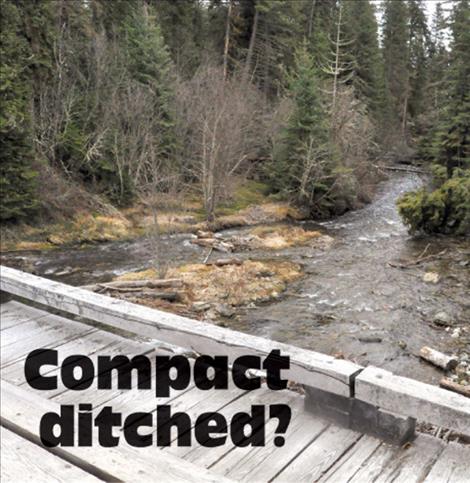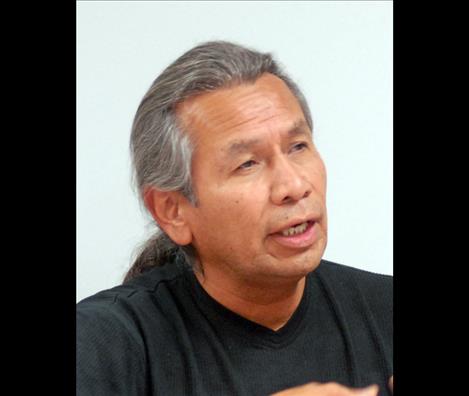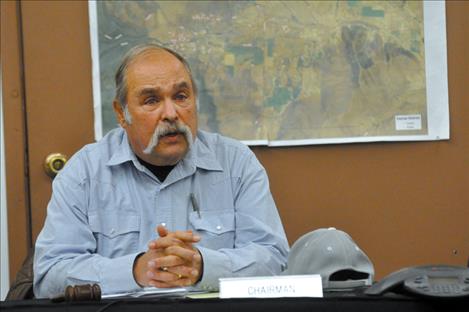Water compact dammed by speaker of house after testimony tsunami
Hey savvy news reader! Thanks for choosing local.
You are now reading
1 of 3 free articles.
Montana Speaker of the House Austin Knudsen quashed an effort by House Democrats to blast the Confederated Salish and Kootenai Water Compact bill to the floor of the statehouse on Monday, after the bill received an adverse committee report that would have prevented it from advancing.
House Democrats said they would appeal the motion to the House Rules Committee, set to meet on Tuesday, to see if the bill could be brought as one of party’s six “silver bullets,” which is a procedural mechanism in place that allows both parties six limited opportunities to bring a bill to a vote before the entire house if the legislation is not approved in committee.
The highly contentious bill was voted down 10-11 in the House Judiciary Committee on Monday after a Saturday hearing where people rose early and packed buses that departed Mission Valley before dawn to be part of a 10-hour long final public hearing for the bill.
The $55 million water compact is the last chance for the state and tribal governments to agree to a settlement of the tribes’ water rights, instead of having the tribes file those claims in Montana Water Court. A state-imposed June 30 deadline looms for passage of the compact. If the document is not ratified by then, the tribes will file their claims in water court. Tribal leadership has indicated as many as 10,000 claims could be filed across the state in the adjudication process.
Bill sponsor and Senate Republican Chas Vincent of Libby urged the House Judiciary Committee to pass the bill from committee to the House floor for final legislative approval. The Montana Senate passed the bill in February. Vincent explained he was opposed to an earlier version of the compact that was proposed in 2013, but that work during 2014 greatly improved the document.
“There are a lot of substantive changes that have been made from this compact to the last,” Vincent said.
Representatives for the state attorney general’s office, the governor’s office, the Montana Reserved Water Rights Committee, and multiple agricultural groups spoke in support of the document.
Tribal Chairman Vernon Finley said the compact was a collaborative document in which the tribes gave away much in an effort to be good neighbors and that if the tribes go to court he anticipates the tribes will win.
“I’m not here to pick a fight, but I’m telling you, look at the compact closely, because we gave up far more than anybody else did,” Finley said. “We have given up more than we necessarily had to and we could regain if we went to court. It’s up to you. As political leaders you will have the choice of listening to a very vocal, anti-minority, or doing what’s best for your constituents, Indian and non-Indian.”
Testimony from local irrigators showed a split in the farming community.
Pro-compact Flathead Joint Board of Control Irrigation Commissioner Paul Guenzler testified in favor of the compact, which goes against the irrigation board’s official position, saying that recent elections of county commissioner and legislators showed support for the compact.
Other irrigators spoke in favor.
“Without the Compact, 40 years from now we’ll be looking back and thinking how foolish we were,” Ronan irrigator Jack Horner said. “We’ve always had faith and trust in the fact that we will have access to the water we need. Without the Compact, all of that will be put into question.”
But just as strong were the voices of opposition.
“The one section of users that has a target on its back in this compact is irrigators,” attorney Jon Metropoulos said on behalf of irrigation clients on and off the Flathead Reservation. “If you read through this compact … you will find that the one user not protected is irrigation. That too is unacceptable.”
Flathead Joint Board of Control Chairman Jerry Laskody told legislators that the compact was flawed.
“The compact is poorly drafted, internally inconsistent, and it deprives Flathead project irrigators of at least 55 percent of their measured historic water deliveries,” Laskody said. Water experts spoke in favor and against the measurements Laskody quoted.
Irrigator Wade Shepard said he was also concerned existing water rights would be protected.
“There are many flaws with this compact,” Shepard said. “It is bad for Montana, bad for Montana water rights and devastating for the agriculture interests in Mission Valley.”
If the compact is ratified, it will still have to be ratified by the United States Congress and the Confederated Salish and Kootenai Tribes.





















